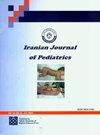The Effects of a Gluten-Free/Casein-Free Diet on Behavioral Indices in Children with Autism Spectrum Disorder: A Systematic Review and Meta-Analysis
IF 0.4
4区 医学
Q4 PEDIATRICS
引用次数: 0
Abstract
Introduction: Autism is a neurological disorder that has seen an increase in prevalence in recent years. It is hypothesized that diet may influence mental health and improve the behavioral symptoms of autism. Objectives: The purpose of this study is to examine the effects of gluten-free and casein-free diets on children with autism. Data Sources: International databases such as Google Scholar, PubMed, Cochrane, and Science Direct were searched using keywords including Autism, Gluten-free, Casein, Diet, and Autistic Disorder, without any time restriction Study Selection: Ultimately, 8 articles were selected for the final analysis. Data Extraction: The study revealed that gluten-free/casein-free (GF/CF) diets had a significantly positive effect on the behavior index of autistic children. In terms of the behavior index, the effect size was a standard mean difference (SMD) of -0.27 (P = 0.001) with a 95% confidence interval (CI) of -0.424 to -0.116. A meta-analysis comparing intervention and control groups indicated that the GF/CF diet had an effect size of SMD = -0.27 (P = 0.001) with a 95% CI of -0.429 to -0.112 on the behavior index. Results: The results of these studies were synthesized using the fixed effects model of meta-analysis with STATA version 14. Conclusions: Given the positive impact of the GF/CF diet on improving the behavior of autistic children, this dietary approach can be considered as a means to enhance behavioral symptoms in these children.无麸质/无酪蛋白饮食对自闭症谱系障碍儿童行为指标的影响:系统回顾与元分析
简介自闭症是一种神经系统疾病,近年来发病率有所上升。据推测,饮食可能会影响心理健康并改善自闭症的行为症状。研究目的本研究旨在探讨无麸质和无酪蛋白饮食对自闭症儿童的影响。数据来源:使用自闭症、无麸质、酪蛋白、饮食和自闭症等关键词在谷歌学术、PubMed、Cochrane 和 Science Direct 等国际数据库中进行搜索,没有任何时间限制 研究选择:最终选择了 8 篇文章进行最终分析。数据提取:研究显示,无麸质/无酪蛋白(GF/CF)饮食对自闭症儿童的行为指数有明显的积极影响。在行为指数方面,效应大小为标准平均差(SMD)-0.27(P = 0.001),95% 置信区间(CI)为-0.424 至-0.116。对干预组和对照组的荟萃分析表明,GF/CF 饮食对行为指数的影响大小为 SMD = -0.27 (P = 0.001),95% 置信区间为 -0.429 至 -0.112。研究结果使用 STATA 14 版本的固定效应荟萃分析模型对这些研究结果进行了综合分析。得出结论:鉴于 GF/CF 饮食对改善自闭症儿童行为的积极影响,这种饮食方法可被视为改善这些儿童行为症状的一种手段。
本文章由计算机程序翻译,如有差异,请以英文原文为准。
求助全文
约1分钟内获得全文
求助全文
来源期刊
CiteScore
0.90
自引率
20.00%
发文量
75
审稿时长
6-12 weeks
期刊介绍:
Iranian Journal of Pediatrics (Iran J Pediatr) is a peer-reviewed medical publication. The purpose of Iran J Pediatr is to increase knowledge, stimulate research in all fields of Pediatrics, and promote better management of pediatric patients. To achieve the goals, the journal publishes basic, biomedical, and clinical investigations on prevalent diseases relevant to pediatrics. The acceptance criteria for all papers are the quality and originality of the research and their significance to our readership. Except where otherwise stated, manuscripts are peer-reviewed by minimum three anonymous reviewers. The Editorial Board reserves the right to refuse any material for publication and advises that authors should retain copies of submitted manuscripts and correspondence as the material cannot be returned. Final acceptance or rejection rests with the Editors.

 求助内容:
求助内容: 应助结果提醒方式:
应助结果提醒方式:


